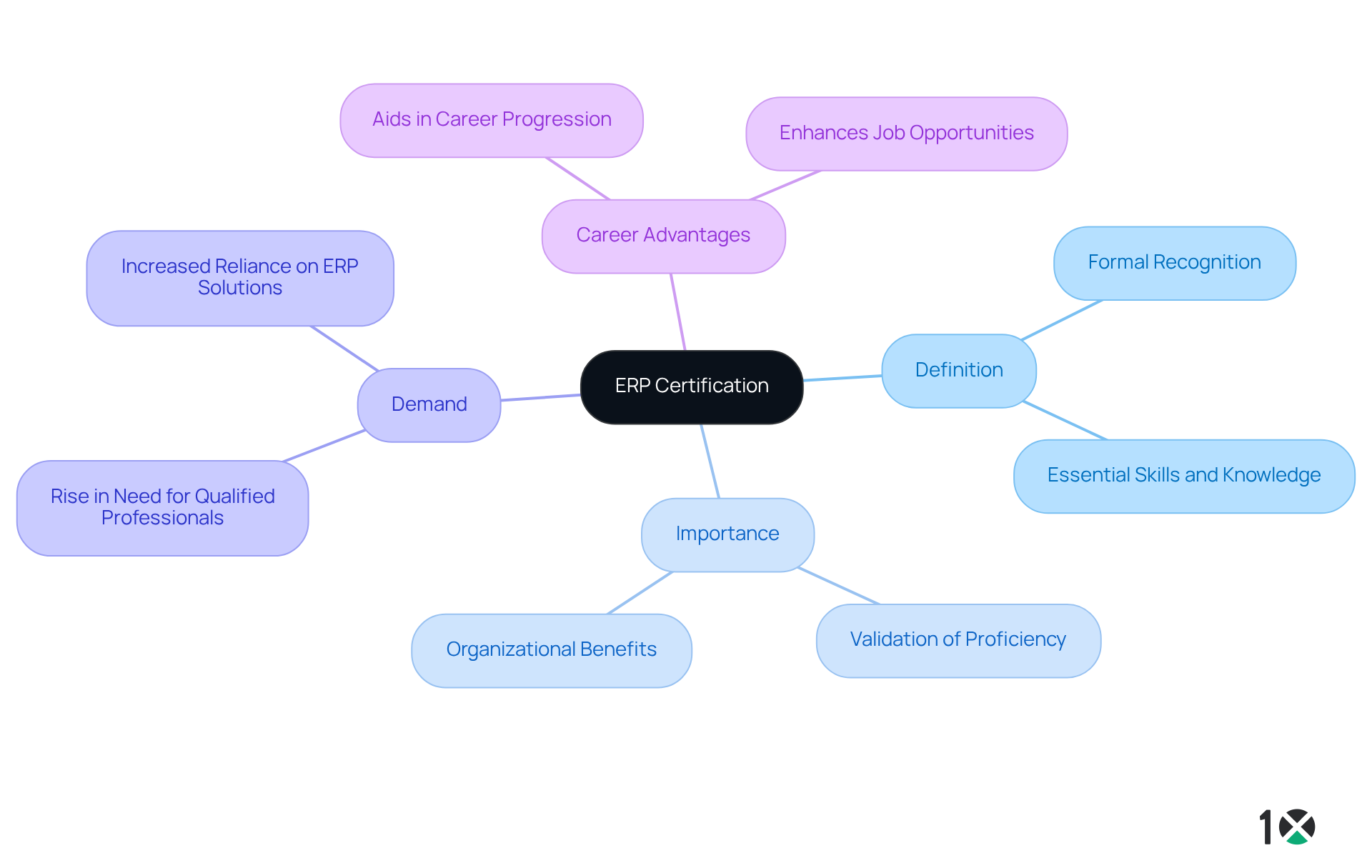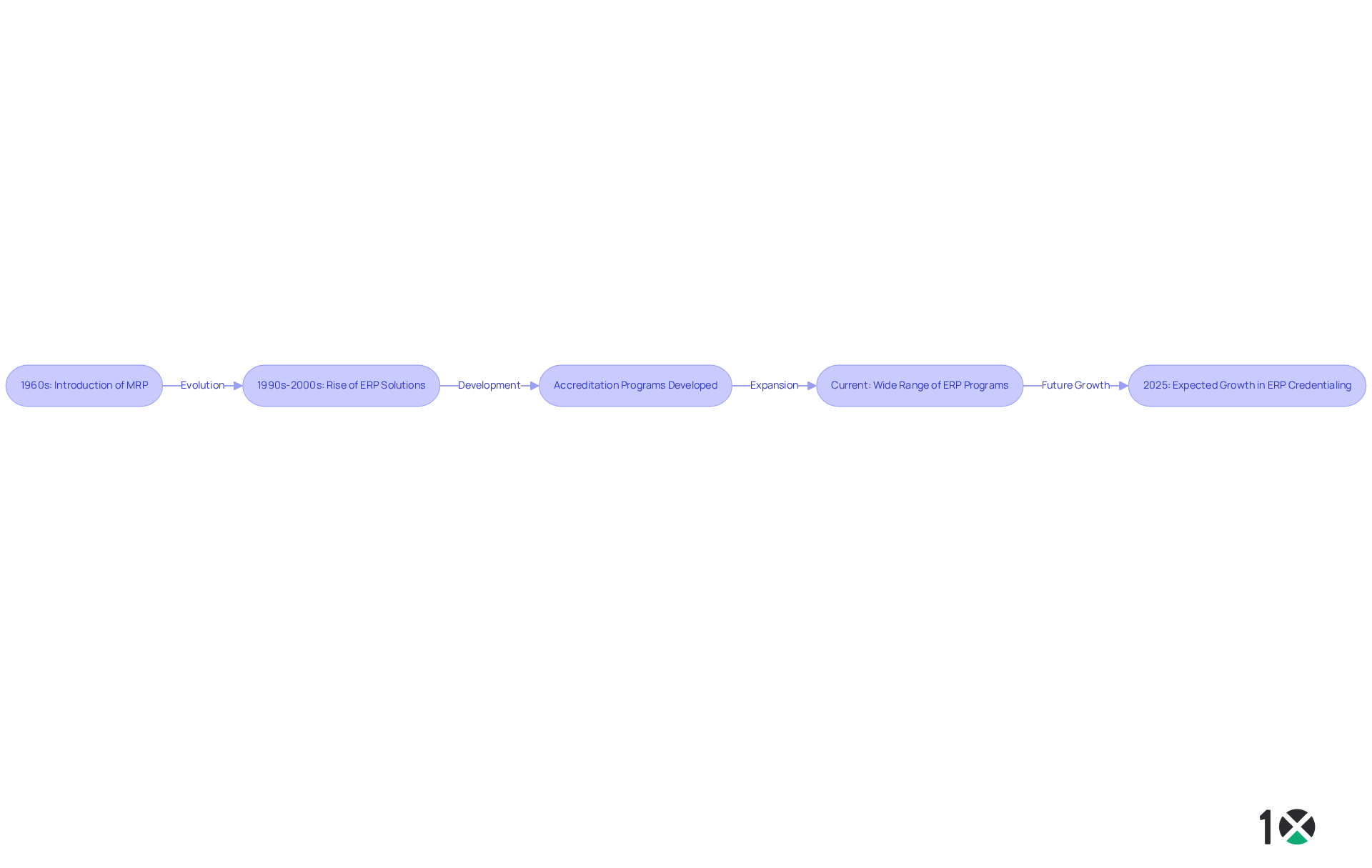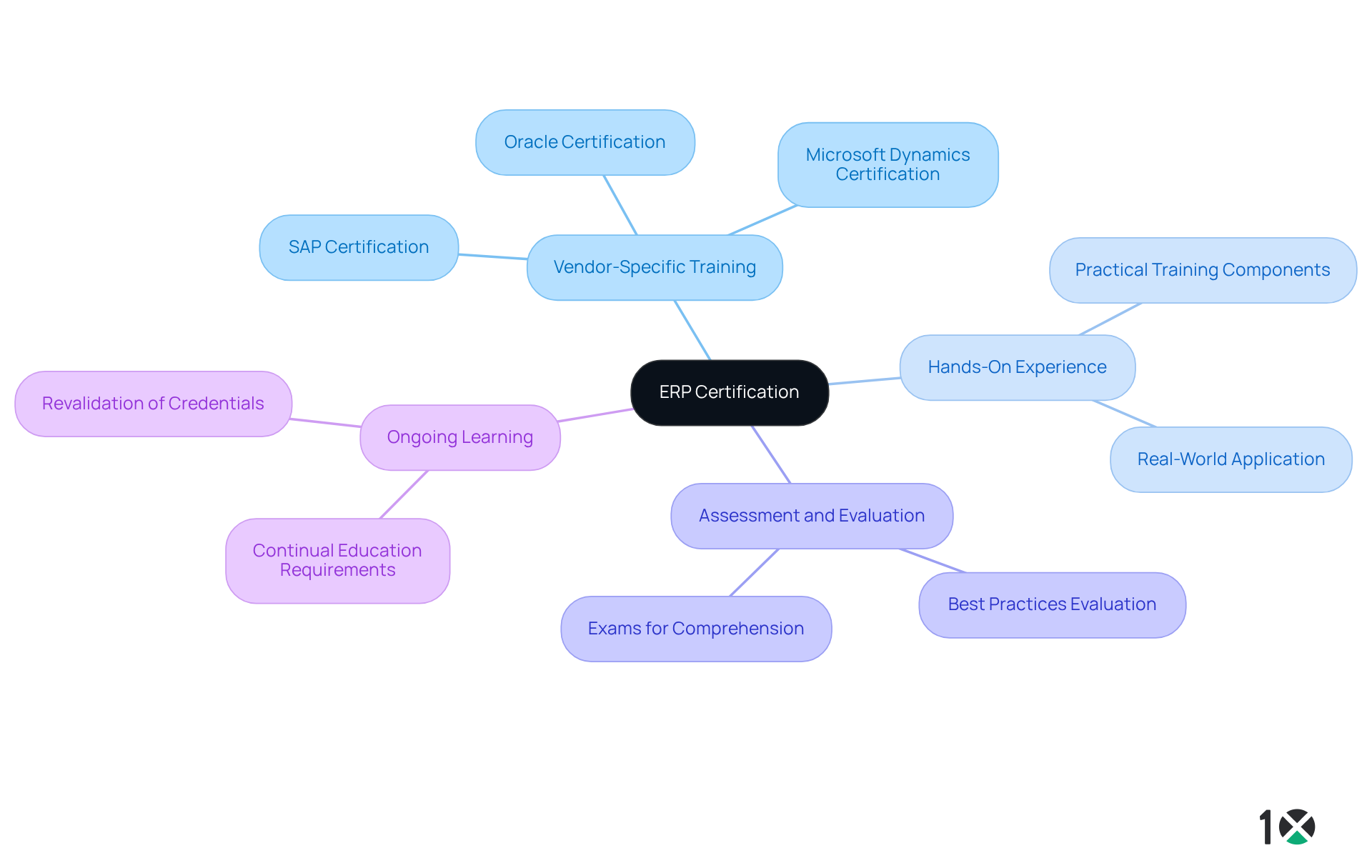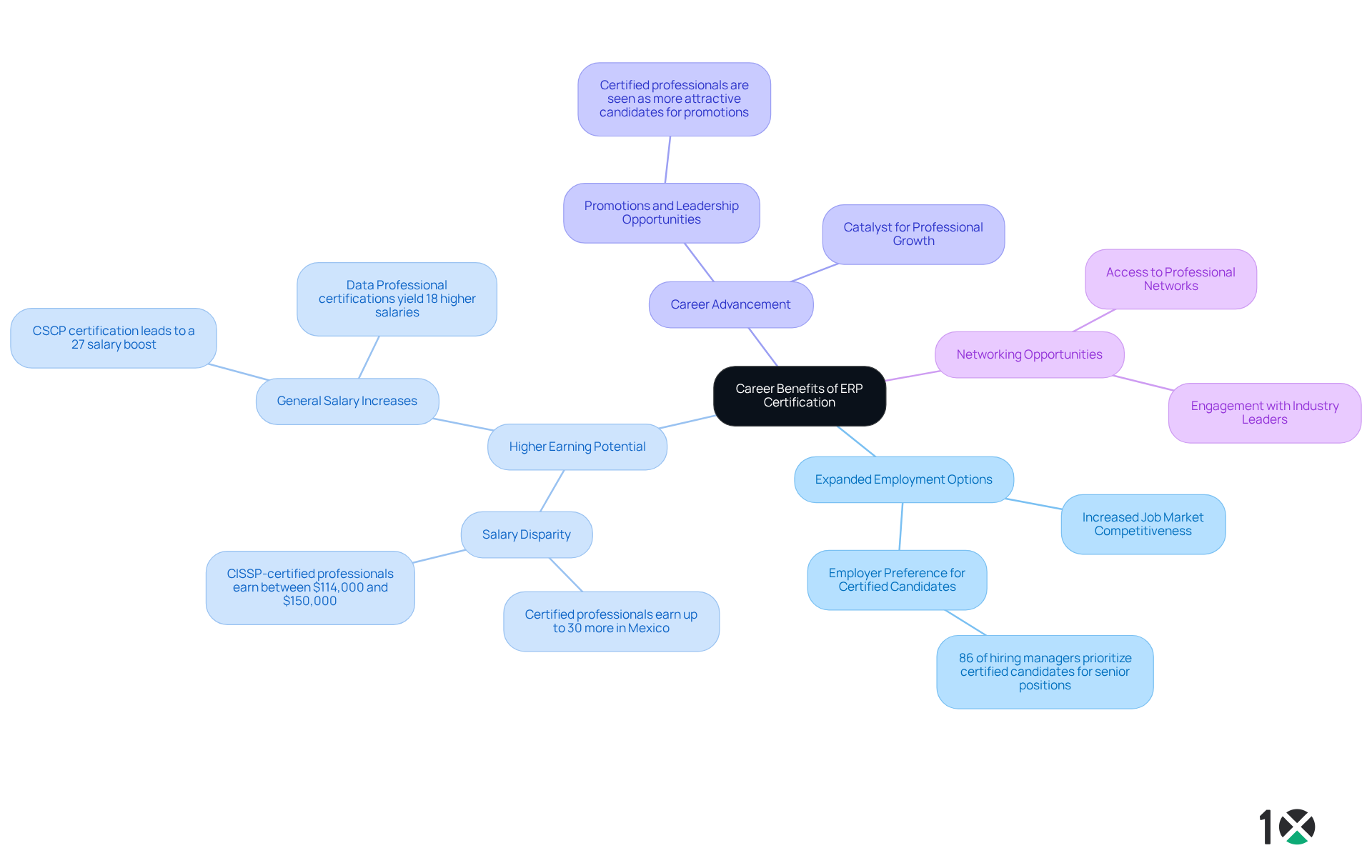Overview
ERP certification serves as a formal acknowledgment of an individual’s expertise in implementing and managing Enterprise Resource Planning systems. In today’s market, where businesses increasingly depend on these solutions, such certification is vital for career advancement. This article illustrates that obtaining ERP certification not only validates one’s skills but also significantly enhances job prospects, earning potential, and opportunities for career progression. Organizations are actively seeking qualified professionals capable of navigating the complexities of ERP systems, making this certification a strategic asset for those aiming to elevate their careers.
Introduction
The landscape of professional qualifications is rapidly evolving, with ERP certification emerging as a vital credential in the business world. This certification not only validates an individual’s expertise in managing complex Enterprise Resource Planning systems but also significantly enhances career prospects in a competitive job market. As organizations increasingly rely on these systems to drive efficiency, a critical question arises: how can professionals leverage ERP certification to secure a job and propel their careers forward amidst the challenges of a constantly changing technological environment?
Define ERP Certification and Its Relevance
ERP certification signifies formal recognition of an individual’s acquisition of essential skills and knowledge necessary for the effective implementation and management of Enterprise Resource Planning (ERP) systems. This credential is attainable through various training courses and assessments offered by software companies or educational institutions.
The importance of ERP certification lies in its ability to validate a person’s proficiency in handling complex ERP software, which is a critical asset for organizations striving to enhance their operations. As businesses increasingly rely on ERP solutions to unify and optimize their processes, the demand for qualified professionals with ERP certification surges. Consequently, this qualification emerges as a significant advantage for career progression.

Trace the Evolution of ERP Certification
The evolution of ERP qualifications dates back to the 1960s, coinciding with the introduction of Material Requirements Planning (MRP) frameworks. As businesses embraced these foundational technologies, the demand for specialized training became increasingly clear. In the 1990s and 2000s, as ERP solutions advanced, leading software companies such as SAP, Oracle, and Microsoft recognized the vital role of accreditation programs. These initiatives were designed to equip professionals with the essential skills required for ERP certification, enabling them to implement and manage ERP solutions effectively.
Today, ERP certification encompasses a wide range of programs tailored to various software platforms and industry needs, reflecting the complex nature of contemporary ERP systems and their integration into business operations. By 2025, the number of ERP credentialing programs is expected to continue expanding, addressing the evolving landscape of enterprise resource planning. Notably, the global ERP market is projected to reach approximately $52 billion by 2025, underscoring the increasing demand for certified professionals.
Moreover, with 50% of ERP implementations failing on the first attempt, the significance of qualifications in achieving successful outcomes cannot be overstated. This highlights the critical need for organizations to invest in ERP certification and training, ensuring their teams are well-prepared to navigate the challenges of modern enterprise resource planning.

Identify Key Characteristics of ERP Certification
Key characteristics of ERP certification are essential for professionals aiming to excel in the field.
- Vendor-Specific Training is a cornerstone, as certifications are often tailored to specific ERP platforms such as SAP, Oracle, or Microsoft Dynamics. This ensures candidates acquire relevant skills directly applicable to the software they will utilize in their ERP certification.
- Hands-On Experience is equally vital; effective credentialing programs incorporate practical training components, enabling candidates to apply their knowledge in real-world scenarios. This practical application is crucial for mastering ERP functionalities.
- Moreover, Assessment and Evaluation play a significant role. Most qualifications require candidates to pass exams that assess their comprehension of ERP concepts, functionalities, and best practices, thereby ensuring a solid foundation for ERP certification.
- Lastly, Ongoing Learning is paramount. Given the rapid technological advancements, numerous credentials necessitate continual education or revalidation, ensuring professionals remain informed about the latest developments in ERP technologies.
Additionally, in-app video tutorials offered by platforms such as 10X ERP serve as valuable resources for candidates preparing for assessments. These guides, developed by the creators of the features, provide practical insights and training that enhance understanding and application of ERP systems. Ultimately, they support Operations Managers in their roles, fostering both competence and confidence.

Explore Career Benefits of ERP Certification
Obtaining an ERP certification provides significant career advantages that can transform your professional trajectory.
-
Expanded Employment Options: Certified professionals often stand out in the job market. Employers tend to favor candidates with credentials, as they reflect a commitment to the industry and a proven skill set.
-
Higher earning potential is evident as research indicates that individuals with ERP certification typically command higher salaries than their non-certified peers. This disparity underscores the value of their specialized knowledge and expertise.
-
Career Advancement: Achieving certification can be a catalyst for promotions and leadership opportunities within organizations. It signals a higher level of competency and knowledge that employers seek in their leaders.
-
Networking Opportunities: Many certification programs offer access to professional networks and communities. This allows certified individuals to engage with peers and industry leaders, fostering connections that can lead to further career advancements.
In summary, obtaining ERP certification not only enhances your qualifications but also opens doors to greater opportunities in your career.

Conclusion
ERP certification stands as a crucial credential for professionals aspiring to thrive in the competitive realm of enterprise resource planning. By validating an individual’s expertise in managing and implementing ERP systems, this certification not only boosts employability but also demonstrates a commitment to professional development within a field that is integral to modern business operations.
The article outlines the evolution of ERP certification, tracing its origins from the early days of material requirements planning to the advanced programs available today. It underscores the significance of vendor-specific training, hands-on experience, and continuous education as essential components of effective certification programs. Moreover, it highlights the tangible career benefits associated with obtaining ERP certification, such as increased job opportunities, enhanced earning potential, and pathways to career advancement.
The importance of ERP certification cannot be overstated. As organizations increasingly depend on ERP solutions to optimize their processes, the demand for certified professionals is set to rise. Investing in ERP certification not only equips individuals for the challenges of the modern job market but also positions them as invaluable assets within their organizations. Seizing this opportunity can lead to a more fulfilling and successful career in the ever-evolving landscape of enterprise resource planning.
Frequently Asked Questions
What is ERP certification?
ERP certification signifies formal recognition of an individual’s acquisition of essential skills and knowledge necessary for the effective implementation and management of Enterprise Resource Planning (ERP) systems.
How can one obtain ERP certification?
ERP certification can be attained through various training courses and assessments offered by software companies or educational institutions.
Why is ERP certification important?
The importance of ERP certification lies in its ability to validate a person’s proficiency in handling complex ERP software, which is a critical asset for organizations striving to enhance their operations.
What is the relevance of ERP certification in today’s job market?
As businesses increasingly rely on ERP solutions to unify and optimize their processes, the demand for qualified professionals with ERP certification surges, making it a significant advantage for career progression.
